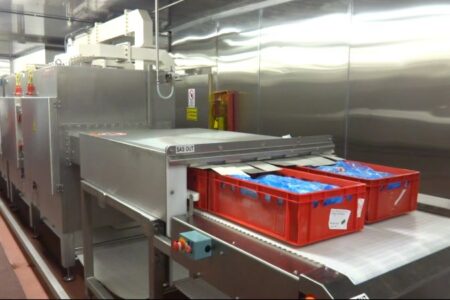Hidden gem

Image: Meati
There’s a global rush to develop alternative proteins to a point where they can be produced on an industrial scale at an appropriate price. Protein is an essential part of a healthy diet, and with the global population expected to reach almost 10 billion people by 2050, much larger quantities of protein-rich produced foods will be needed.
Meeting this demand is not without its challenges. The livestock sector is responsible for 14.5 per cent of global greenhouse gas (GHG) emissions, and food production as a whole accounts for 26 per cent of global GHG. On top of this, meat consumption worldwide has more than doubled in the past thirty years and it will keep on rising 1.6% per year for the next ten years. Obviously, this is leading to a lack of meat stocks to match the global demand for protein. With an increase in scarce resources, on top of lowering global consumption of proteins, there is also demand for an alternative to land-based meat production to tackle the future of proteins. Consequently, sustainably produced alternative proteins, especially ones that easily integrate into people’s diets, will contribute to decreased emissions and help us meet global climate goals. Quite simply we need to produce affordable, nutritious and sustainable alternative solutions to meet tomorrow’s protein demand today – safely, reliably, and responsibly.
Step forward Meati Foods, an American-based alternative protein company who makes animal-free, whole-food protein from mycelium. Mycelium, the mushroom’s vegetative roots, are able to take in sugars from their environment and, through fermentation, transform them into nutrient-rich proteins. Through this innovative process, mycelium can be transformed into a variety of plant-based foods. Meati is confident its X will play a huge role in our food system in the future. But there are many challenges standing between full production and our plates. Meati recently announced the launch of its inaugural scientific advisory board, the Meati Scientific Advisory Board (MSAB).
Headed by Dr. Harold Schmitz, former chief science officer at Mars, the five member board, composed of top scientists in the fields of nutrition and food science, aims to research the full spectrum of health benefits offered by mushroom root, a term used to describe the mycelium in all Meati products.
According to Schmitz, the MSAB will focus on five major themes: nutrition, taste and sensory, sustainability, affordability, and scale.
Founded in 2016 by Tyler Huggins and Justin Whiteley, Meati develops animal-free food products starting with chicken and beef. Meati cultivates a specific strain of mushroom root to create their current set of products, including chicken breast, crispy cutlet, and steak fillet.
The mission and vision of Meati is simple. The earth’s human population is currently 8 billion and on a fast-track to 10 billion by 2050. It’s no secret that our food systems are far from perfect, with land, water, and other natural resources severely strained.
“Our goal with Meati is to contribute to the development of a nutritious, equitable, and resilient food system, and we fundamentally believe that people are healthier with a healthier planet and vice versa,” says a company spokesperson. “Over the next few years, we want to make it easy for people to diversify their eating experiences in ways that are undeniably enjoyable, nutritious, and sustainable.”
Meati was founded on a commitment to develop food solutions good for the health of people and the planet, and Meati wants to strengthen this commitment by working with the MSAB to unlock the vast potential of mycelium and mycelia in general.
Justin Whiteley, CTO and co-founder of Meati Foods says: “At Meati, we believe consumers and the environment win when we invest in rigorous scientific understanding of our products, and the MSAB was created with that goal in mind.”
Difference maker
Meati is not plant-based nor animal-based. It’s a new animal-free meat made from mushroom root protein – and that mushroom root let’s Meati deliver on key things that consumers have been calling for but failing to find in options to date: incredible flavour and texture; remarkable nutrition with complete protein, significant fibre, and a host of micronutrients; a simple and clean ingredient list; and sustainability.
As for how it’s made, it starts with mushroom root, which is grown in nutrient-dense water for optimal purity and nutritional content.
“After being harvested, the roots are gently formed into whole-cuts and colouring and flavouring is added. As the cuts are formed, we are able to arrange the roots to replicate the textures of specific animal cuts, so our whole cuts can have the texture of a chicken breast, sirloin or anything else,” the spokesperson explains.
Meati’s own research shows that more than 60 per cent of the general population wants to consume less animal meat. The key is they want delicious, nutritious, clean, and ethically and environmentally sustainable animal-free meat.
“Early market signals demonstrate that Meati’s product attributes, as well as our cuts – steaks and cutlets – are resonating and unlocking possibilities,” a spokesperson says. “Meati is more than another alt protein option. We’re creating a roadmap for how alt proteins can scale, be democratised for better access, and be healthy, sustainable, and delicious.”
Demand for meat alternatives has grown and will continue to rise, but the industry still has hurdles to overcome. Scale is one of the critical challenges in the industry as a whole.
“If consumers can’t access alternative proteins, whether that’s Meati or something else, then they will likely purchase animal-based meat. We are seeing huge, unmet demand for animal-free alternatives, which is why we focused on large-scale production with facilities like our Mega Ranch. It can generate tens of millions of pounds of Meati at full capacity. We are laying the groundwork for our next ranch facility, an even larger one that will be capable of producing hundreds of millions of pounds annually.
Nutrition is a key factor for consumers – and as a result, it’s a key factor for Meati. While much work remains to better understand the full benefits of mushroom root (mycelium) as a part of a regular diet, there is already evidence of the exciting health potential of this new whole-food source of complete protein. Below is a look at some of the nutritional aspects of the Classic Cutlet:
Meati’s mycelium is already known to offer complete protein (PDCAAS 1.0), and research into other types of mycelia suggests it may also have positive impacts on heart health, digestion, the immune system, and blood glucose levels.
Options abound, yet not all options are created equal, and one of the oldest methods of recreating a meat-like texture is resurfacing as a front-runner positioned to revolutionise plant-based protein. Not only is mycoprotein high in dietary fibre, low in fat and full of riboflavin, folate, phosphorus, zinc, choline and manganese, but it is also a highly versatile ingredient. As the timing is no doubt right, mycelium can win over consumers with taste, nutritional, functional, scalable, and impact-related benefits.



